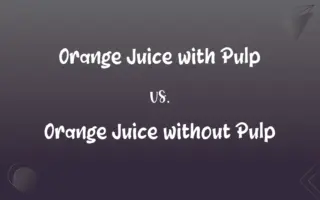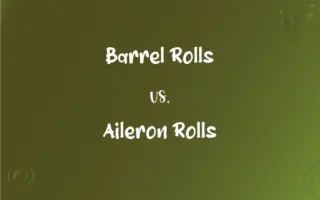Hydrated Copper Sulphate vs. Anhydrous Copper Sulphate: What's the Difference?
Edited by Aimie Carlson || By Janet White || Published on February 21, 2024
Hydrated copper sulphate is copper sulphate with water molecules chemically bound; Anhydrous copper sulphate is copper sulphate devoid of water molecules.

Key Differences
Hydrated copper sulphate, known as copper sulphate pentahydrate, contains water molecules in its crystal structure. In contrast, anhydrous copper sulphate lacks these water molecules. The presence or absence of water significantly impacts their physical properties and chemical reactivity.
The hydrated form of copper sulphate appears as blue crystals due to water in its composition. Anhydrous copper sulphate, on the other hand, is a white powder or colorless crystalline solid, reflecting its lack of water content.
Hydrated copper sulphate is commonly used in agriculture as a fungicide and for educational purposes in chemistry experiments. Anhydrous copper sulphate, being more reactive due to the absence of water, is used in chemical synthesis and as a desiccant.
Hydrated copper sulphate is more stable and less reactive than its anhydrous counterpart. Anhydrous copper sulphate, being water-free, is more reactive, particularly in processes involving water.
Anhydrous copper sulphate can be formed by heating hydrated copper sulphate, which drives off the water. Conversely, the anhydrous form can absorb water from the air or when exposed to moist conditions, converting back to the hydrated form.
ADVERTISEMENT
Comparison Chart
Chemical Composition
Contains water molecules
Lacks water molecules
Physical Appearance
Blue crystals
White powder or colorless crystals
Uses
Fungicide, educational purposes
Chemical synthesis, desiccant
Reactivity
Less reactive, more stable
More reactive
Conversion
Loses water on heating
Absorbs water to become hydrated
ADVERTISEMENT
Hydrated Copper Sulphate and Anhydrous Copper Sulphate Definitions
Hydrated Copper Sulphate
It's a copper salt combined with water molecules, forming copper sulphate pentahydrate.
Hydrated copper sulphate's blue color is due to the water in its structure.
Anhydrous Copper Sulphate
It's copper sulphate devoid of water, making it highly reactive, especially with water.
Anhydrous copper sulphate quickly absorbs water, turning blue.
Hydrated Copper Sulphate
In hydrated form, copper sulphate serves educational purposes in crystal growing experiments.
Students grew blue crystals using hydrated copper sulphate.
Anhydrous Copper Sulphate
This form of copper sulphate is also utilized in some types of battery production.
Anhydrous copper sulphate is a component in certain battery chemistries.
Hydrated Copper Sulphate
Hydrated copper sulphate is a blue crystalline solid used in chemistry experiments.
We used hydrated copper sulphate to demonstrate a chemical reaction in class.
Anhydrous Copper Sulphate
Anhydrous copper sulphate is a white powder used as a desiccant and in chemical synthesis.
We used anhydrous copper sulphate in the lab as a drying agent.
Hydrated Copper Sulphate
Commonly used as a fungicide in agriculture due to its chemical properties.
Farmers spray hydrated copper sulphate to prevent fungal infections in crops.
Anhydrous Copper Sulphate
Anhydrous copper sulphate is produced by heating hydrated copper sulphate to remove water.
Heating hydrated copper sulphate produces anhydrous copper sulphate.
Hydrated Copper Sulphate
This compound changes from blue to white when heated, losing its water content.
Upon heating, the hydrated copper sulphate turned white, indicating water loss.
Anhydrous Copper Sulphate
In its anhydrous form, the compound is used for moisture control applications.
The anhydrous copper sulphate was used to keep the environment moisture-free.
FAQs
What are the uses of anhydrous copper sulphate?
In chemical synthesis, as a desiccant, and in some battery productions.
What is hydrated copper sulphate?
Copper sulphate combined with water molecules, forming blue crystals.
Why is hydrated copper sulphate blue?
The water molecules in its structure give it a characteristic blue color.
How is hydrated copper sulphate used?
As a fungicide in agriculture and for educational chemistry experiments.
What is anhydrous copper sulphate?
Copper sulphate without water, appearing as a white powder or colorless crystals.
What color is anhydrous copper sulphate?
It's white or colorless when anhydrous.
Is anhydrous copper sulphate reactive?
Yes, it's more reactive than the hydrated form, especially with water.
What happens when anhydrous copper sulphate absorbs water?
It turns blue and becomes hydrated.
How is anhydrous copper sulphate produced?
By heating hydrated copper sulphate to drive off water.
Can hydrated copper sulphate become anhydrous?
Yes, by heating to remove the water molecules.
Why is anhydrous copper sulphate used as a desiccant?
Its ability to absorb moisture makes it effective for drying purposes.
Can anhydrous copper sulphate be converted back to the hydrated form?
Yes, by exposing it to moisture.
What safety measures are needed when handling copper sulphate?
Use gloves and eye protection, and avoid ingestion or inhalation.
What is the chemical formula for hydrated copper sulphate?
CuSO4·5H2O.
Is hydrated copper sulphate safe to handle?
With proper safety precautions, but it is a toxic substance.
How can you identify hydrated copper sulphate?
By its blue color and crystalline structure.
What is the appearance of anhydrous copper sulphate?
A white powder or colorless crystals when water-free.
Is anhydrous copper sulphate used in agriculture?
Rarely, as its hydrated form is more common for agricultural purposes.
Does hydrated copper sulphate have any educational applications?
Yes, it's used in crystal growing experiments and chemical demonstrations.
Are there environmental concerns with copper sulphate use?
Yes, it can be toxic to aquatic life and should be used responsibly.
About Author
Written by
Janet WhiteJanet White has been an esteemed writer and blogger for Difference Wiki. Holding a Master's degree in Science and Medical Journalism from the prestigious Boston University, she has consistently demonstrated her expertise and passion for her field. When she's not immersed in her work, Janet relishes her time exercising, delving into a good book, and cherishing moments with friends and family.
Edited by
Aimie CarlsonAimie Carlson, holding a master's degree in English literature, is a fervent English language enthusiast. She lends her writing talents to Difference Wiki, a prominent website that specializes in comparisons, offering readers insightful analyses that both captivate and inform.






































































